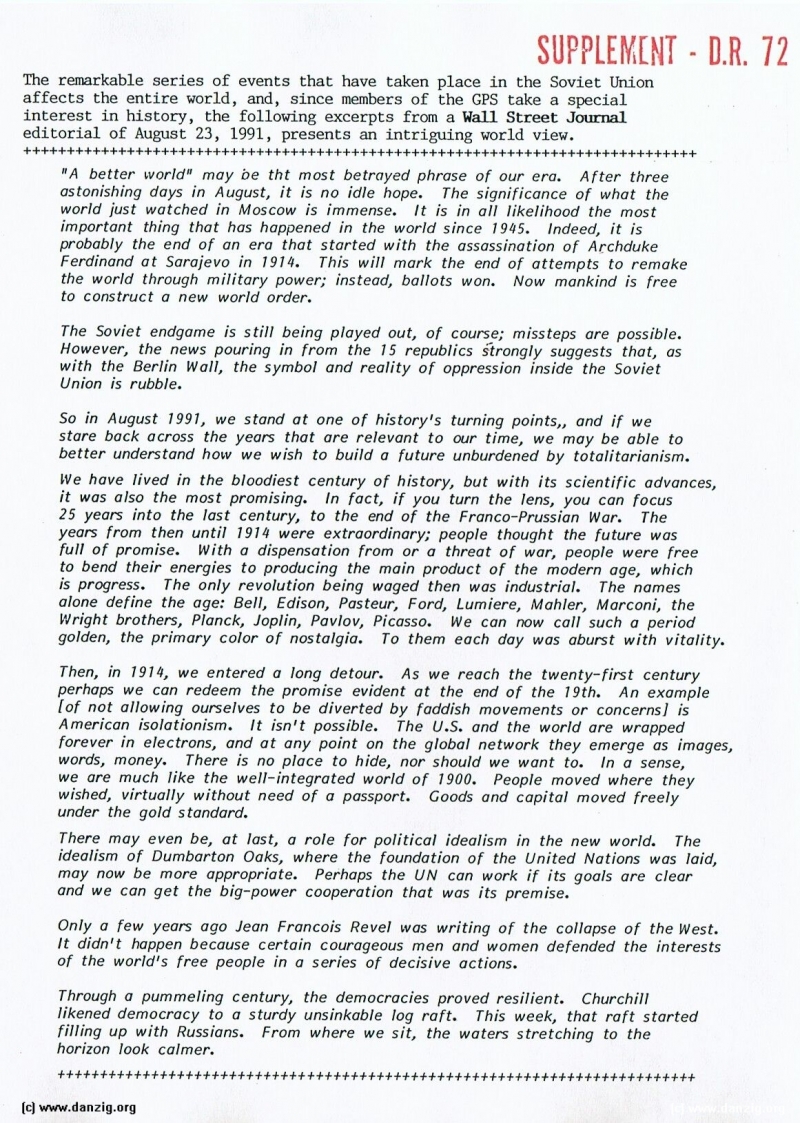
The remarkable series of events that have taken place in the Soviet Union affects the entire world, and, since members of the GPS take a special interest in history, the following excerpts from a Wail Street Journal editorial of August 23, 1991, presents an intriguing world view.
A better world” may oe tht most betrayed phrase of our era. After three astonishing days in August, it is no idle hope. The significance of what the world just watched in Moscow is immense. It is in all likelihood the most important thing that has happened in the world since 1945. Indeed, it is probably the end of an era that started with the assassination of Archduke Ferdinand at Sarajevo in 1914. This will mark the end of attempts to remake the world through military power; instead, ballots won. Now mankind is free to construct a new world order.
The Soviet endgame is still being played out, of course; missteps are possible. However, the news pouring in from the 15 republics trongly suggests that, as with the Berlin Wall, the symbol and reality of oppression inside the Soviet Union is rubble.
So in August 1991, we stand at one of history’s turning points,, and if we stare back across the years that are relevant to our time, we may be able to better understand how we wish to build a future unburdened by totalitarianism.
We have lived in the bloodiest century of history, but with its scientific advances, it was also the most promising. In fact, if you turn the lens, you can focus 25 years into the last century, to the end of the Franco-Prussian War. The years from then until 1914 were extraordinary; people thought the future was full of promise. With a dispensation from or a threat of war, people were free to bend their energies to producing the main product of the modern age, which is progress. The only revolution being waged then was industrial. The names alone define the age: Bell, Edison, Pasteur, Ford, Lumiere, Mahler, Marconi, the Wright brothers, Planck, Joplin, Pavlov, Picasso. We can now call such a period golden, the primary color of nostalgia. To them each day was aburst with vitality.
Then, in 1914, we entered a long detour. As we reach the twenty-first century perhaps we can redeem the promise evident at the end of the 19th. An example (of not allowing ourselves to be diverted by faddish movements or concerns] is American isolationism. It isn’t possible. The U.S. and the world are wrapped forever in electrons, and at any point on the global network they emerge as images, words, money. There is no place to hide, nor should we want to. In a sense, we are much like the well-integrated world of 1900. People moved where they wished, virtually without need of a passport. Goods and capital moved freely under the gold standard.
There may even be, at last, a role for political idealism in the new world. The idealism of Dumbarton Oaks, where the foundation of the United Nations was laid, may now be more appropriate. Perhaps the UN can work if its goals are clear and we can get the big-power cooperation that was its premise.
Only a few years ago Jean Francois Revel was writing of the collapse of the West. It didn’t happen because certain courageous men and women defended the interests of the world’s free people in a series of decisive actions.
Through a pummeling century, the democracies proved resilient. Churchill likened democracy to a sturdy unsinkable log raft. This week, that raft started filling up with Russians. From where we sit, the waters stretching to the horizon look calmer.
Danzig Report Vol. 1 - Nr. 72 - July - August - September - 1991, Page 31.
Hits: 2394
Added: 30/06/2015
Copyright: 2024 Danzig.org

